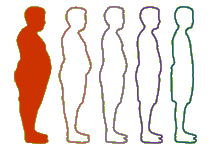

Have You Tried Everything to Lose Weight
With No Success?
Have You Been Accused by Your Healthcare Practitioner
of “Not Trying Hard Enough”? Or of “Cheating”?
You’re Not Crazy, Your Doctor Is.
And here’s why:
It is a myth that all weight gain stems from overeating, poor eating habits, or lack of proper exercise. Such misconceptions not only lead to discrimination of those who are overweight, but it also interferes and diminishes the ability to determine the actual causes and remedies available to assist them.
![]()
 Despite the popular myth, not everyone gains weight as a result of excessive calorie intake. For some, there is no binge eating, no emotional eating, nor any other source of aberrant behavior that results in too many calories being ingested. Despite no dramatic changes in their diet or lifestyle, some people literally wake up one morning to discover their weight has jumped up an alarming amount and that the same clothes they wore just days before no longer come close to fitting.
Despite the popular myth, not everyone gains weight as a result of excessive calorie intake. For some, there is no binge eating, no emotional eating, nor any other source of aberrant behavior that results in too many calories being ingested. Despite no dramatic changes in their diet or lifestyle, some people literally wake up one morning to discover their weight has jumped up an alarming amount and that the same clothes they wore just days before no longer come close to fitting.
For some people, large amounts of weight gain can be driven by fluid retention (edema). Contrary to such popular myths as it’s just water, weight gain caused by excessive fluid retention that is connected to sensitivity to food and environmental chemicals is significantly more difficult to lose than weight gain caused by excessive caloric intake or a lack of adequate exercise. Furthermore, weight gain caused by excessive fluid retention that is brought on by food and environmental chemical sensitivity requires discovering which chemicals are causing the reactions, followed by removal of those chemicals from the diet and environment in order for weight loss to occur, and techniques, strategies and a developed skill-set to assure the weight stays off.

 Never before in our history have we been exposed to so many different types of toxins on a daily basis. This is because never before have there been so many chemicals in our food and environment. Chemicals are widely used today as additives, preservatives and colorings in our food. And it doesn't stop there: they are also in our cosmetics, lotions, soaps, shampoos, laundry and cleaning products, and in the air at malls, theaters, airplanes, airports, grocery stores and work places. They are in over-the-counter and prescription drugs, in our carpets and other flooring, and in virtually everything you can taste, swallow, smell, see and touch — and even in some things you can’t.
Never before in our history have we been exposed to so many different types of toxins on a daily basis. This is because never before have there been so many chemicals in our food and environment. Chemicals are widely used today as additives, preservatives and colorings in our food. And it doesn't stop there: they are also in our cosmetics, lotions, soaps, shampoos, laundry and cleaning products, and in the air at malls, theaters, airplanes, airports, grocery stores and work places. They are in over-the-counter and prescription drugs, in our carpets and other flooring, and in virtually everything you can taste, swallow, smell, see and touch — and even in some things you can’t.
With all of this chemical exposure it would only make sense that some people might begin to experience “toxic overload”. And, in fact, for many people that is exactly what has happened.
Healthcare practitioners who subscribe only to the traditional weight loss model are unaware of the effects of Chemical Reactivity Syndrome (CRS) and its link to weight gain and difficulty losing weight, among other symptoms. Fortunately however, there are solutions…
